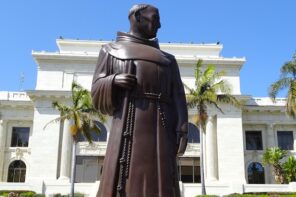Julia Duin, religion writer for the Washington Times in a column on March 12 attempts to rekindle the dying embers of the 2004 election campaign debate about denying communion to politicians who disagree with the Vatican’s position on abortion.
Duin speculates about the fate of Kansas Governor Kathleen Sebelius soon to take up residence in the Diocese of Washington DC as HHS secretary. Sebelius a pro-choice Catholic has had the misfortune of living in one of the half dozen or so dioceses where Bishops have either told legislators to refrain from receiving communion, or issued not-in-my-backyard threats against candidates who do not live in their diocese, telling them they would not be welcome to receive communion should they ever show up in their fiefdom.
Fiefdom is a reasonable synonym for Diocese in the Roman Catholic context, for each bishop is a little prince with feudal powers. For all the talk about Roman Catholicism as a centralized power, the fact is that individual bishops pretty much get to call the shots in their diocese. For Sibelius, this means that while she may be refraining from receiving communion in her home diocese, she is free to receive it in almost all other dioceses in the country.
Washington DC has, in the minds of ultra conservative anti-abortion Catholics, been a particular thorn in their side. Former Cardinal Theodore McCarrick (and Cardinal Hickey before him) was adamant in his refusal to deny communion to legislators who disagreed on abortion or other issues. Anti-abortion groups such as the Catholic-led American Life League were so furious with this position that they took out full page ads in the Washington Times and other papers calling on the Vatican to discipline McCarrick in 2004, even picketing his retirement Mass. The Cardinal thus got a very slight taste of what women who go to abortion clinics face when they meet a wall of rosary-praying, placard-carrying screaming anti-abortionists on one of the most stressful days of their lives.
Duin wonders what current DC Archbishop Donald Wuerl will do. To date, Wuerl has refused to consider denying communion to legislators who disagree with church policy on abortion legislation. He prefers he says, to be in dialogue on the issue. And indeed, many pro-choice Senators, Representatives, Supreme Court Justices and administration officials who are prochoice and Catholic regularly and publicly receive communion in DC. You can see them for example at the annual “Red Mass” in September which honors the opening of the Supreme Court session.
Wuerl, of course, is making a canonically sound decision not to use communion against legislators who vote for pro-choice bills. There is no canonical or theological error in their actions. There are no formal teachings on how best to prevent or reduce the need for abortion. Most Catholics legislators say they agree with the church’s moral view that abortion is objectively wrong, but have an obligation to respect the views of all religions. They have long taken the currently fashionable view that the way to prevent abortion is to make it less necessary, not illegal.
But Wuerl, like other bishops is also politically astute. Denying communion to Senators Kennedy, Mikulski, Leahy, etc is just not good politics. The line for communion would be woefully short were prochoice Catholics to refrain. Duin once interviewed me on the subject and I told her I received communion without incident regularly in DC. In fact, I would probably receive it more regularly if someone told me I couldn’t. I do not believe we should give power to church leaders in this area of our lives. And I would feel obliged as a role model to prove they just had no power to stop me. Will we see wanted pictures of those who cannot receive communion in our churches? I doubt it.
Threats of denying communion tend to backfire. When a New Jersey bishop declared his diocese a communion free zone for prochoice legislators in 2004; three of them publicly resisted. One became an Episcopalian; the other said he’d go to Mass in New York and a third just said that was the end of Mass for him.
Duin suggests that bishops who have imposed sanctions on politicians in other dioceses should pick up the phone and call Wuerl and ask him to extend the penalties to the DC diocese. They are about as likely to be successful as the Catholics who have petitioned the Vatican to excommunicate such Catholics. The Vatican has carried a big stick, but excommunicated no one.




